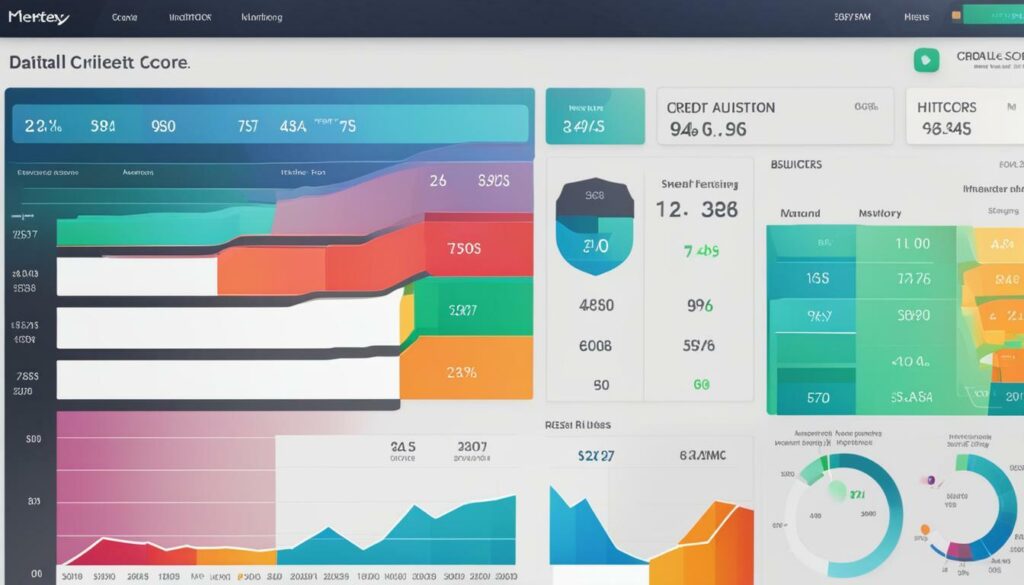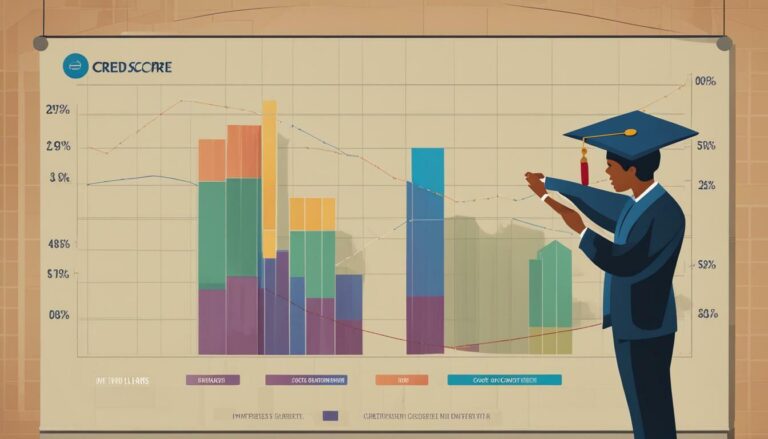Understanding Credit Scoring Implications for Entrepreneurs

As an entrepreneur, understanding the credit scoring implications is crucial for managing your business finances effectively in the United States. Credit scores play a vital role in securing funding, negotiating favorable terms, and building credibility with lenders and suppliers. They provide a snapshot of your creditworthiness and are used by financial institutions to assess the risk associated with lending to you.
Business credit scores, ranging from 0 to 100, are based on various factors such as credit history, payment history, credit utilization ratio, and public records. A good credit score improves your chances of obtaining loans, attracting customers, and negotiating better terms with suppliers.
To improve your business credit score, it is important to pay bills on time, maintain a healthy credit utilization ratio, and work with entities that report trades and payments to credit bureaus. Negative data, such as late payments or defaults, can remain on your credit report for a certain period of time, impacting your credit score.
It’s worth noting that personal credit scores also influence business credit scores. As an entrepreneur, it is essential to focus on improving your personal credit as well. By utilizing business credit cards, net 30 accounts, and minimizing credit utilization, you can demonstrate your creditworthiness and improve your overall credit scores.
🚨 TUIC Errors + Low Credit Score?
CreditScoreIQ helps you build credit faster by reporting utility bills to all 3 bureaus—while you dispute errors.
Start Building Credit Today →Paying all bills on time is crucial for maintaining a positive credit history and improving your credit scores. This not only enhances your chances of obtaining financing opportunities, but also strengthens your financial credibility in the eyes of lenders and suppliers.
Understanding and actively managing your credit scores is key to accessing funding, negotiating favorable terms, and building a solid financial foundation for your business. By knowing the credit scoring implications and implementing strategies to improve your creditworthiness, you can position yourself for long-term success as an entrepreneur.
- Credit scores are crucial for securing funding, negotiating terms, and building credibility.
- Business credit scores are based on credit history, payment history, utilization ratio, and public records.
- Improving credit scores requires paying bills on time and working with entities that report to credit bureaus.
- Personal credit affects business credit, so focus on improving both.
- Using business credit tools and maintaining a positive credit history are essential for creditworthiness.
The Role of Business Credit Scores for Entrepreneurs
Business credit scores play a crucial role in determining the creditworthiness of entrepreneurs and are essential for small business owners. These scores range from 0 to 100 and are based on various factors, including credit history, payment history, credit utilization ratio, and public records. Understanding the implications of business credit scores is vital for entrepreneurs to secure funding, negotiate favorable terms, and build credibility with lenders and suppliers.
To improve credit scores and enhance creditworthiness, entrepreneurs should focus on several key strategies. Firstly, paying bills on time is crucial for maintaining a positive credit history. Late or missed payments can negatively impact credit scores, making it more difficult to obtain financing and attract customers. It’s important to prioritize timely payments to demonstrate reliability and financial responsibility.
“Paying bills on time is crucial for maintaining a positive credit history.”
In addition to timely payments, entrepreneurs should also aim to maintain a healthy credit utilization ratio. This ratio represents the amount of available credit that is being utilized, with lower ratios generally being more favorable. By minimizing credit utilization and keeping balances low, entrepreneurs can showcase their ability to manage credit responsibly and improve their business credit scores.
Furthermore, entrepreneurs can leverage business credit cards and net 30 accounts to demonstrate their creditworthiness. Using these financial tools responsibly and making timely payments can help establish a positive credit history and improve business credit scores. Working with entities that report trades and payments to credit bureaus is also essential, as this ensures that positive credit behavior is accurately reflected in credit scores.

Creditworthiness is crucial for small business owners as it directly impacts their ability to access financing opportunities and negotiate favorable terms. With good credit scores, entrepreneurs are more likely to secure loans, attract customers, and establish credibility with suppliers. Conversely, low credit scores can limit financing options and hinder business growth. By actively managing and improving their business credit scores, entrepreneurs can enhance their financial credibility, increase their chances of success, and build a solid foundation for their businesses.
| Factors Affecting Business Credit Scores | Strategies to Improve Business Credit Scores |
|---|---|
| Credit history | Pay bills on time |
| Payment history | Maintain a healthy credit utilization ratio |
| Credit utilization ratio | Utilize business credit cards and net 30 accounts responsibly |
| Public records | Work with entities that report trades and payments to credit bureaus |
It’s important for entrepreneurs to remember that business credit scores are not separate from personal credit scores. Personal credit scores also play a significant role in determining creditworthiness for small business owners. This means that entrepreneurs should focus on improving their personal credit as well, as it can impact their ability to secure financing and favorable terms for their businesses.
In summary, understanding and actively managing business credit scores is essential for entrepreneurs to access financing opportunities, negotiate favorable terms, and enhance their financial credibility. By paying bills on time, maintaining a healthy credit utilization ratio, utilizing business credit tools, and working with entities that report to credit bureaus, entrepreneurs can improve their credit scores, increase their creditworthiness, and set their businesses up for success.
Factors Affecting Business Credit Scores
Several factors contribute to the calculation of business credit scores, and understanding how these factors affect entrepreneurs is vital. A strong business credit score is crucial for securing financing, negotiating favorable terms, and building credibility with lenders and suppliers. Let’s explore the key factors that impact business credit scores and the implications for entrepreneurs.
- Credit History: Your business credit history reflects how you have managed credit in the past. Lenders and suppliers rely on this history to assess your creditworthiness and determine the level of risk involved in doing business with you.
- Payment History: Timely bill payments are essential for maintaining a positive credit score. Late payments or defaults can significantly impact your score and raise concerns about your ability to fulfill financial obligations.
- Credit Utilization Ratio: This ratio measures the amount of available credit you are currently using. Maintaining a low credit utilization ratio indicates responsible credit management and can positively influence your business credit score.
- Public Records: Public records, such as bankruptcies, tax liens, and judgments, can have a significant negative impact on your credit score. It is crucial to address any public record issues promptly and work towards resolving them.
By understanding these factors, entrepreneurs can take proactive steps to improve their business credit scores. Paying bills on time, minimizing credit utilization, and addressing any public record issues are all essential strategies. Additionally, partnering with entities that report trades and payments to credit bureaus can help build a positive credit history.

Remember, your personal credit scores also influence your business credit scores. As an entrepreneur, it is essential to focus on improving your personal credit as well. By utilizing business credit cards and net 30 accounts wisely, you can demonstrate your creditworthiness and enhance your business credit scores.
Ultimately, maintaining good credit scores is crucial for entrepreneurs to access financing opportunities, attract customers, and establish financial credibility. By actively managing and understanding their credit scores, entrepreneurs can position themselves for greater success in the competitive business landscape.
| Factors Affecting Business Credit Scores | Impact on Entrepreneurs |
|---|---|
| Credit History | Determines creditworthiness and level of risk |
| Payment History | Evidence of responsible credit management and reliability |
| Credit Utilization Ratio | Indicates credit management and financial responsibility |
| Public Records | Negative impact on credit score and credibility |
Importance of Good Credit Scores for Entrepreneurs
Good credit scores are essential for entrepreneurs as they can significantly impact their business’s success and creditworthiness. As an entrepreneur, your credit score plays a vital role in securing funding, negotiating favorable terms with lenders and suppliers, and building credibility in the business world.
Business credit scores range from 0 to 100 and are based on various factors, including your credit history, payment history, credit utilization ratio, and public records. A higher credit score indicates a lower credit risk, making it easier for you to obtain loans, attract customers, and access better financial opportunities.
To improve your business credit score, it is crucial to pay your bills on time and maintain a healthy credit utilization ratio. Late payments and high credit utilization can negatively impact your creditworthiness and make it difficult for you to secure financing or establish partnerships with key stakeholders.

Furthermore, working with entities that report trades and payments to credit bureaus can positively influence your credit score. By partnering with these entities, you ensure that your positive financial behavior is accurately reflected in your credit report, enhancing your creditworthiness and improving your chances of obtaining favorable terms in the future.
It’s important to note that personal credit scores also impact your business credit score. Therefore, as an entrepreneur, you should focus on improving your personal credit as well. By managing personal credit responsibly, utilizing business credit cards and net 30 accounts, and minimizing credit utilization, you can demonstrate your creditworthiness to lenders and suppliers.
In summary, entrepreneurs must understand and actively manage their credit scores to access financing opportunities, negotiate favorable terms, and enhance their financial credibility. Maintaining good credit scores is a proactive strategy that can open doors to business growth and success.
Strategies to Improve Business Credit Scores
Implementing effective strategies can help entrepreneurs improve their business credit scores and strengthen their creditworthiness. By taking proactive steps, you can enhance your chances of securing funding, negotiating favorable terms, and building credibility with lenders and suppliers.
One important strategy is to pay your bills on time. Timely payments demonstrate your reliability and financial responsibility, which positively impacts your credit score. Set up reminders or automate payments to ensure you never miss a due date.
Another key factor in improving your business credit score is managing your credit utilization ratio. This ratio represents the amount of credit you use compared to the total credit available to you. Keeping your credit utilization below 30% shows lenders that you can effectively manage your credit and reduces the risk associated with lending to your business.
| Strategies to Improve Business Credit Scores: |
|---|
| Pay bills on time |
| Maintain a healthy credit utilization ratio |
| Work with entities that report trades and payments to credit bureaus |
Additionally, it’s crucial to work with entities that report trades and payments to credit bureaus. This includes using business credit cards and establishing net 30 accounts with suppliers. These entities report your payment history, which contributes to your credit score and verifies your creditworthiness.
Remember that personal credit scores also influence your business credit scores. As an entrepreneur, focus on improving your personal credit as well. Minimize your credit utilization on personal credit cards, pay all bills on time, and monitor your credit report for any discrepancies or inaccuracies that could negatively impact your creditworthiness.

- Pay bills on time to demonstrate reliability and financial responsibility.
- Maintain a credit utilization ratio below 30% to show effective credit management.
- Work with entities that report trades and payments to credit bureaus to build credit history and credibility.
- Improve personal credit scores as they impact business credit scores.
By implementing these strategies and actively managing your credit scores, you can position yourself as a creditworthy entrepreneur and open doors to financing opportunities and enhanced financial credibility.
Managing Personal Credit Scores for Entrepreneurial Success
Personal credit scores significantly influence the creditworthiness of entrepreneurs and have implications for their business ventures. As an entrepreneur, it is crucial to understand the impact of personal credit scores on your ability to secure funding, negotiate favorable terms, and build credibility with lenders and suppliers.
Business credit scores range from 0 to 100 and are based on factors such as credit history, payment history, credit utilization ratio, and public records. Maintaining a good credit score improves your chances of obtaining loans, attracting customers, and establishing trust in the business world. It demonstrates your financial responsibility and ability to manage credit effectively.
There are several strategies you can implement to improve your personal credit score and, subsequently, your business creditworthiness. First and foremost, make it a priority to pay all bills on time. Late payments can have a detrimental impact on your credit score and may result in higher interest rates or limited access to financing options.
Additionally, maintaining a healthy credit utilization ratio is important. This ratio compares your outstanding credit card balances to your total available credit limit. Keeping the ratio low, ideally below 30%, shows that you are using credit responsibly and not relying too heavily on borrowed funds. Minimizing credit utilization can positively affect both personal and business credit scores.
Finally, it is advisable to work with entities that report trades and payments to credit bureaus. By utilizing business credit cards and establishing net 30 accounts with suppliers, you can demonstrate a track record of timely payments and responsible borrowing. This proactive approach can help you build your creditworthiness and improve your business credit scores.

| Factors Affecting Personal Credit Scores: |
|---|
| Payment history: Timely payment of bills and debts. |
| Credit utilization ratio: The amount of credit used compared to the total available credit limit. |
| Length of credit history: The age of your credit accounts and the average age of all accounts. |
| Types of credit used: The mix of credit accounts such as credit cards, loans, and mortgages. |
| New credit applications: The number of recent credit inquiries and new accounts opened. |
By actively managing your personal credit scores and taking steps to improve them, you can enhance your creditworthiness as an entrepreneur. This can open up opportunities for financing, attract business partners, and establish a strong reputation in your industry. Remember, the decisions you make regarding your personal credit can have a lasting impact on your business ventures.
Key strategies to improve personal credit scores:
- Pay all bills and debts on time.
- Maintain a healthy credit utilization ratio (below 30%).
- Work with entities that report trades and payments to credit bureaus.
- Regularly review your credit report for inaccuracies or fraudulent activity.
- Minimize the number of new credit applications.
By implementing these strategies and actively managing your personal credit scores, you can position yourself as a creditworthy entrepreneur and increase your chances of success in the business world.
Building Creditworthiness through Financial Tools
Entrepreneurs can build creditworthiness by leveraging financial tools such as business credit cards and net 30 accounts. These tools are designed to help startups and small business owners establish and improve their credit scores, which play a crucial role in securing funding, negotiating favorable terms, and building credibility with lenders and suppliers.
Business credit cards are a valuable tool for entrepreneurs to separate their personal and business expenses while building a positive credit history. By using a business credit card responsibly and making timely payments, entrepreneurs can demonstrate their ability to manage credit and improve their credit scores. It is important to choose a business credit card with features that align with the needs of the business, such as rewards programs or low-interest rates.

Net 30 accounts, also known as vendor credit accounts, allow entrepreneurs to purchase goods or services on credit and pay the invoices within 30 days. These accounts are typically offered by suppliers and vendors who extend credit to businesses they trust. By utilizing net 30 accounts and consistently making timely payments, entrepreneurs can establish positive payment history and strengthen their creditworthiness.
| Benefits of Business Credit Cards and Net 30 Accounts: |
|---|
| 1. Establish and improve credit scores |
| 2. Separate personal and business expenses |
| 3. Demonstrate credit management capabilities |
| 4. Access rewards programs or low-interest rates |
| 5. Build trust and credibility with suppliers |
Entrepreneurs should keep in mind that while these financial tools can be beneficial for building creditworthiness, it is crucial to use them responsibly. It is important to make payments on time, avoid maxing out credit limits, and maintain a healthy credit utilization ratio. By actively managing credit and leveraging these financial tools, entrepreneurs can strengthen their creditworthiness and increase their chances of accessing financing opportunities and achieving entrepreneurial success.
Importance of Timely Bill Payments for Credit History
Timely bill payments are crucial for entrepreneurs to maintain a positive credit history and boost their credit scores. A good credit history reflects your ability to repay debts on time, which is an essential factor considered by lenders and suppliers when assessing your creditworthiness. By consistently paying your bills by their due dates, you demonstrate your financial responsibility and reliability, which can open doors to better financing opportunities and favorable terms.
One effective way to ensure timely bill payments is to create a detailed payment schedule that outlines your upcoming due dates. This schedule can help you stay organized and avoid missing any payments. Additionally, setting up automatic payments can be a convenient and reliable method to ensure your bills are paid on time, as they will be deducted automatically from your bank account.
| Benefits of Timely Bill Payments | Actions to Take |
|---|---|
| 1. Improve credit score | Pay bills by their due dates consistently. |
| 2. Strengthen creditworthiness | Create a payment schedule and set up automatic payments. |
| 3. Access better financing opportunities | Monitor your credit history regularly and dispute any errors or discrepancies. |
It’s important to note that late or missed payments can have a detrimental impact on your credit history. Late payments can result in late fees, increased interest rates, and negative marks on your credit report, which can lower your credit score and make it more challenging to secure favorable financing in the future. Therefore, prioritizing timely bill payments is essential for maintaining a positive credit history and building a solid foundation of financial credibility.

The Impact of Negative Data on Credit Scores
Negative data on credit reports can have a detrimental impact on credit scores and affect entrepreneurs in managing their business finances. Understanding the implications of negative data is crucial for entrepreneurs who rely on credit to secure funding and maintain financial stability.
When negative data, such as late payments, defaults, or bankruptcies, appears on a credit report, it lowers an entrepreneur’s credit score. This can lead to difficulties in obtaining loans, negotiating favorable terms, and building credibility with lenders and suppliers. As a result, entrepreneurs may face limited financing options, higher interest rates, and reduced business opportunities.
To mitigate the impact of negative data on credit scores, entrepreneurs should proactively manage their credit and take steps to repair any damage. This involves paying bills on time, as payment history is a significant factor in determining credit scores. Additionally, minimizing credit utilization by keeping credit card balances low and avoiding excessive debt can also improve creditworthiness.

Furthermore, entrepreneurs can work with entities that report trades and payments to credit bureaus, such as suppliers and lenders. By establishing positive relationships with these entities, entrepreneurs can improve their credit scores and enhance their financial credibility.
It is important to note that negative data can remain on a credit report for a certain period of time, depending on the type of information. For example, late payments can stay on a credit report for up to seven years, while bankruptcies can remain for up to ten years. Therefore, it is essential for entrepreneurs to be proactive in managing their credit and resolving any negative issues as soon as possible.
| Key Takeaways: |
|---|
| Negative data on credit reports can lower credit scores and impact entrepreneurs’ access to financing and business opportunities. |
| Entrepreneurs should prioritize paying bills on time and maintaining a low credit utilization ratio to improve creditworthiness. |
| Working with entities that report trades and payments can help entrepreneurs enhance their credit scores and build financial credibility. |
| Entrepreneurs should be proactive in managing their credit and resolving any negative issues promptly. |
Long-Term Implications of Credit Scores
Credit scores have long-term implications for entrepreneurs, impacting their access to financing opportunities and overall financial credibility. A credit score is a numerical representation of an individual’s creditworthiness, and it plays a crucial role in determining whether entrepreneurs can secure loans, negotiate favorable terms, and build trust with lenders and suppliers. Understanding the importance of credit scores is vital for entrepreneurs looking to establish and grow their businesses.
Business credit scores range from 0 to 100 and are based on several factors, including credit history, payment history, credit utilization ratio, and public records. A good credit score demonstrates responsible financial management and improves the chances of obtaining loans, attracting customers, and establishing favorable business relationships.
To improve their credit scores, entrepreneurs should adopt strategies such as paying bills on time, maintaining a healthy credit utilization ratio, and working with entities that report trades and payments to credit bureaus. By establishing a track record of timely payments and responsible credit utilization, entrepreneurs can demonstrate their creditworthiness and enhance their business credit scores.
| Strategies to Improve Business Credit Scores | Benefits |
|---|---|
| Pay bills on time | Shows financial responsibility and improves creditworthiness |
| Maintain a healthy credit utilization ratio | Demonstrates responsible credit management |
| Work with entities that report trades and payments to credit bureaus | Increase visibility and credibility with lenders and suppliers |
It’s important to note that negative data, such as late payments or defaults, can remain on a credit report for a certain period of time, which can have a negative impact on credit scores. Entrepreneurs should strive to minimize negative data and focus on building a positive credit history to strengthen their credit scores over time.
Personal credit scores also influence business credit scores, so entrepreneurs should prioritize improving their personal credit as well. By utilizing financial tools such as business credit cards, net 30 accounts, and minimizing personal credit utilization, entrepreneurs can demonstrate their creditworthiness and improve their overall credit scores.

Maintaining a positive credit history and actively managing credit scores are essential for entrepreneurs to access financing opportunities and enhance their overall financial credibility. By understanding the long-term implications of credit scores and implementing effective credit management strategies, entrepreneurs can establish a strong financial foundation for their businesses and pave the way for future success.
Leveraging Credit Reporting Entities to Improve Credit Scores
Entrepreneurs can improve their credit scores by working with entities that report trades and payments to credit bureaus. These entities play a crucial role in determining and enhancing an entrepreneur’s creditworthiness. By reporting timely payments and positive financial behavior, these entities contribute to building a favorable credit history that can open doors to better financing opportunities and terms.
One effective strategy is to establish trade lines with suppliers and vendors that report payment data to credit bureaus. This allows entrepreneurs to showcase their responsible financial behavior and build a positive credit profile. Partnering with suppliers who are willing to report trade and payment information is a proactive step towards improving business credit scores. This information provides evidence of the entrepreneur’s ability to manage financial obligations effectively and can lead to increased credibility in the eyes of lenders and suppliers.
In addition to working with credit reporting entities, entrepreneurs should also focus on maintaining a healthy credit utilization ratio. This ratio compares the amount of credit used to the total available credit and is an important factor in determining creditworthiness. Keeping this ratio below 30% demonstrates responsible credit management and can positively impact credit scores. Entrepreneurs can achieve this by regularly monitoring their credit utilization and making efforts to pay down existing debts and balances.

Another aspect worth considering is the importance of personal credit scores in influencing business credit scores. Entrepreneurs should not neglect their personal credit as it plays a significant role in determining their overall creditworthiness. By managing personal credit responsibly, entrepreneurs can demonstrate their financial integrity and build a strong foundation for their business credit scores.
In conclusion, understanding the impact of credit scores on entrepreneurs and actively managing them is essential for accessing financing opportunities and enhancing financial credibility. By leveraging credit reporting entities, maintaining a healthy credit utilization ratio, and focusing on personal credit management, entrepreneurs can improve their credit scores and strengthen the foundation for their business’s financial success.
Conclusion
Understanding and actively managing credit scores is essential for entrepreneurs to access financing opportunities and enhance their financial credibility.
Factual data shows that credit scoring implications play a vital role in helping entrepreneurs secure funding, negotiate favorable terms, and build credibility with lenders and suppliers. Business credit scores, ranging from 0 to 100, are determined by factors such as credit history, payment history, credit utilization ratio, and public records.
By maintaining good credit scores, entrepreneurs improve their chances of obtaining loans and attracting customers to their businesses. To achieve this, it is crucial to pay bills on time and keep a healthy credit utilization ratio. Working with entities that report trades and payments to credit bureaus can also contribute to improving business credit scores.
Furthermore, entrepreneurs should not overlook the impact of personal credit scores on their business credit scores. It is important to focus on improving personal credit as well, ensuring a positive influence on overall creditworthiness.
Utilizing financial tools such as business credit cards and net 30 accounts can help entrepreneurs demonstrate their creditworthiness and enhance their business credit scores. Additionally, minimizing credit utilization and paying all bills on time are crucial for maintaining a positive credit history.
To summarize, understanding and actively managing credit scores is key for entrepreneurs to access financing opportunities and enhance their financial credibility. By implementing strategies to improve business and personal credit scores, entrepreneurs position themselves for success in securing funding, attracting customers, and building strong financial foundations for their businesses.
FAQ
1. How do credit scoring implications affect entrepreneurs?
Understanding credit scoring implications is crucial for entrepreneurs to secure funding, negotiate favorable terms, and build credibility with lenders and suppliers.
2. What factors affect business credit scores?
Business credit scores are based on factors such as credit history, payment history, credit utilization ratio, and public records.
3. What is the importance of good credit scores for entrepreneurs?
Good credit scores improve the chances of obtaining loans and attracting customers for entrepreneurs.
4. How can entrepreneurs improve their business credit scores?
Entrepreneurs can improve their business credit scores by paying bills on time, maintaining a healthy credit utilization ratio, and working with entities that report trades and payments to credit bureaus.
5. Do personal credit scores influence business credit scores?
Yes, personal credit scores also influence business credit scores, so entrepreneurs should focus on improving their personal credit as well.
6. How can entrepreneurs build creditworthiness through financial tools?
Entrepreneurs can build creditworthiness by utilizing business credit cards, net 30 accounts, and minimizing credit utilization.
7. Why are timely bill payments important for credit history?
Timely bill payments are crucial for maintaining a positive credit history and improving credit scores for entrepreneurs.
8. What is the impact of negative data on credit scores?
Negative data can remain on a credit report for a certain period of time, affecting the credit score and potentially hindering opportunities for entrepreneurs.
9. What are the long-term implications of credit scores for entrepreneurs?
Credit scores have long-term implications for entrepreneurs as they can influence business opportunities and enhance their financial credibility.
10. How can entrepreneurs leverage credit reporting entities to improve credit scores?
Working with entities that report trades and payments to credit bureaus can help entrepreneurs improve their credit scores.
Ready to Improve Your Credit?
Disputing TUIC errors is step one. Step two? Boost your score by reporting utility payments with CreditScoreIQ.
Get Started Now (Only $1 Trial) →3-bureau reporting • $1M identity insurance • Dark web monitoring






